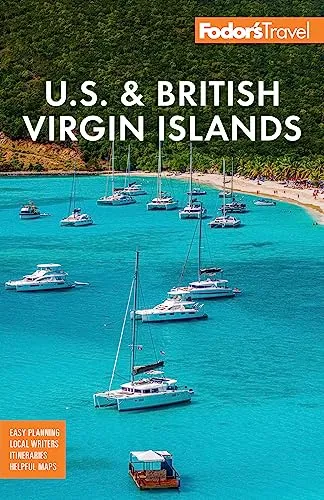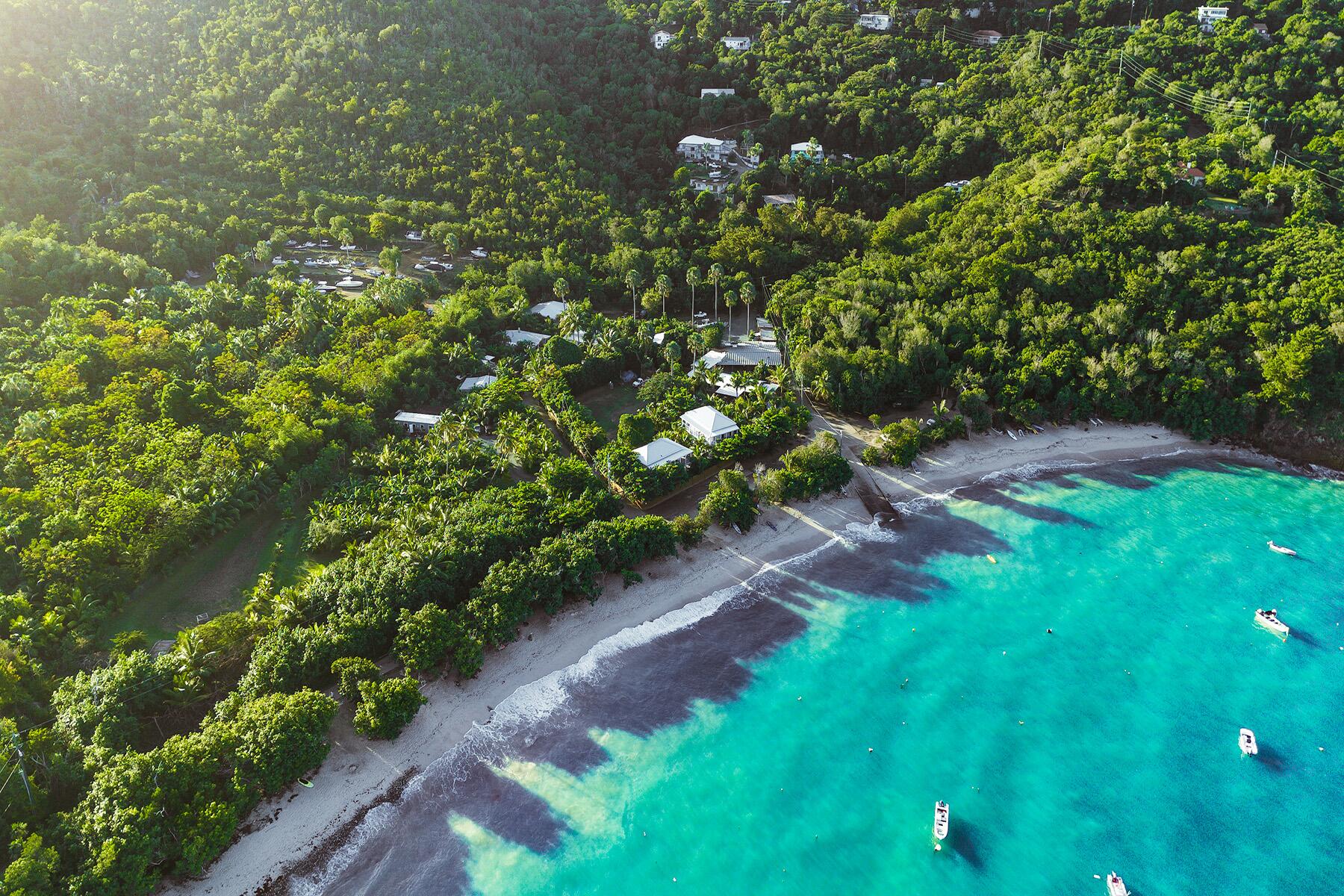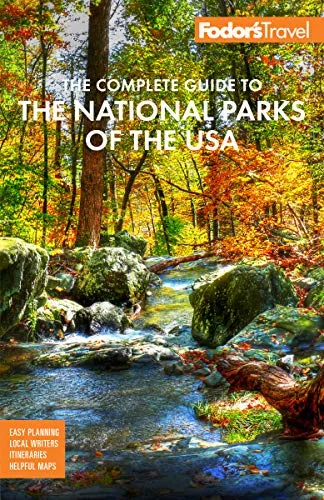St. Thomas
St. Thomas
Because it's the transportation hub of the Virgin Islands, most visitors land on hilly St. Thomas even if they don't linger. Visitors who stay longer may be drawn by the legendary shopping and the wide variety of water sports, activities, beaches, and accommodations. The bustling port of Charlotte Amalie is the main town, while Red Hook sits on the eastern tip. The west end of the island is relatively wild, and hotels and resorts rim the southern and eastern shores.
If you fly to the 32-square-mile (83-square-km) island of St. Thomas, you land at its western end; if you arrive by cruise ship, you come into one of the world's most beautiful harbors. Either way, one of your first sights is the town of Charlotte Amalie. From the harbor you see an idyllic-looking village that spreads...
Read MoreBecause it's the transportation hub of the Virgin Islands, most visitors land on hilly St. Thomas even if they don't linger. Visitors who stay longer may be drawn by the legendary shopping and the wide variety of water sports, activities, beaches, and accommodations. The bustling port of Charlotte Amalie is the main town, while Red Hook sits on the eastern tip. The west end of the island is relatively wild, and hotels and resorts rim the southern and eastern shores.
If you fly to the 32-square-mile (83-square-km) island of St. Thomas, you land at its western end; if you arrive by cruise ship, you come into one of the world's most beautiful harbors. Either way, one of your first sights is the town of Charlotte Amalie. From the harbor you see an idyllic-looking village that spreads into the lower hills. If you were expecting a quiet hamlet with its inhabitants hanging out under palm trees, you've missed that era by about 300 years. Although other islands in the USVI developed plantation economies, St. Thomas cultivated its harbor, and it became a thriving seaport soon after it was settled by the Danish in the 1600s.
The success of the naturally perfect harbor was enhanced by the fact that the Danes—who ruled St. Thomas with only a couple of short interruptions from 1666 to 1917—avoided involvement in some 100 years' worth of European wars. Denmark was the only European country with colonies in the Caribbean to stay neutral during the War of the Spanish Succession in the early 1700s. Accordingly, products of the Dutch, English, and French islands—sugar, cotton, and indigo—were traded through Charlotte Amalie, along with the regular shipments of slaves. When the Spanish wars ended, trade fell off, but by the end of the 1700s Europe was at war again, Denmark again remained neutral, and St. Thomas continued to prosper. Even into the 1800s, while the economies of St. Croix and St. John foundered with the market for sugarcane, St. Thomas's economy remained vigorous. This prosperity led to the development of shipyards, a well-organized banking system, and a large merchant class. In 1845 Charlotte Amalie had 101 large importing houses owned by the English, French, Germans, Haitians, Spaniards, Americans, Sephardim, and Danes.
Charlotte Amalie is still one of the world's most active cruise-ship ports. On almost any day at least one and sometimes as many as eight cruise ships are tied to the docks or anchored outside the harbor. Gently rocking in the shadows of these giant floating hotels are just about every other kind of vessel imaginable: sleek sailing mono- and multihulls that will take you on a sunset cruise complete with rum punch and a Jimmy Buffett sound track, private megayachts that spirit busy executives away, and barnacle-bottom sloops—with laundry draped over the lifelines—that are home to world-cruising gypsies. Huge container ships pull up in Sub Base, west of the harbor, bringing in everything from breakfast cereals to tires. Anchored right along the waterfront are down-island barges that ply the waters between the Greater Antilles and the Leeward Islands, transporting goods like refrigerators, VCRs, and disposable diapers.
The waterfront road through Charlotte Amalie was once part of the harbor. Before it was filled in to build the highway, the beach came right up to the back door of the warehouses that now line the thoroughfare. Two hundred years ago those warehouses were filled with indigo, tobacco, and cotton. Today the stone buildings house silk, crystal, linens, and leather. Exotic fragrances are still traded, but by island beauty queens in air-conditioned perfume palaces instead of through open market stalls. The pirates of old used St. Thomas as a base from which to raid merchant ships of every nation, though they were particularly fond of the gold- and silver-laden treasure ships heading to Spain. Pirates are still around, but today's versions use St. Thomas as a drop-off for their contraband: illegal immigrants and drugs.
Recommended Fodor’s Video
Hotels
Things to Do
Things to Do
Explore Things to Do
Find the perfect tours and activities in St. Thomas.
Where to Eat
Where to Eat
Need to Know
Need to Know
Language
EnglishNearby Airports
STTElectrical Outlets
110v/60 cycle; plugs are U.S. standard two- and three-prongCurrency
U.S. dollarLanguage
EnglishElectrical Outlets
110v/60 cycle; plugs are U.S. standard two- and three-prongCurrency
U.S. dollarNearby Airports
STTNeighborhood Guides
Discover the best neighborhoods in St. Thomas with curated recommendations from our editors.
essentials
transportation
resources
Local Weather
Neighborhood Guides
Discover the best neighborhoods in St. Thomas with curated recommendations from our editors.
Local Weather
Neighborhood Guides
Discover the best neighborhoods in St. Thomas with curated recommendations from our editors.
essentials
transportation
resources
Articles
Articles See All
Guidebooks
Guidebooks
Our worldwide travel correspondents bring you the best and most up-to-date coverage of over 7,500 global destinations.
Shop NowFodor's U.S. & British Virgin Islands
For over 80 years, Fodor's Travel has been a trusted resource offering expert travel...
Fodor's The Complete Guide to the National Parks of the USA: All 63 parks from Maine to American Samoa
Whether you want to hike through the jaw-dropping scenery of Acadia, see rare wildlife and...














